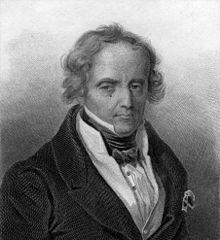Maria Edgeworth Quotes

The human heart, at whatever age, opens to the heart that opens in return.
Maria Edgeworth (1837). “Helen, etc”, p.52
Maria Edgeworth, Richard Lovell Edgeworth (1825). “Works”, p.346
Maria Edgeworth (1848). “Tales and novels: in 9 volumes”, p.265
Hope can produce the finest and most permanent springs of action.
Maria Edgeworth (1894). “The Life and Letters of Maria Edgeworth”
Surely it is much more generous to forgive and remember, than to forgive and forget.
Maria Edgeworth (1832). “Castle Rackrent: And Irish Bulls”, p.303
Maria Edgeworth, Richard Lovell Edgeworth (1826). “Works of Maria Edgeworth: Tales of fashionable life. 1826.- -v. 7. Patronage. 1825”, p.426
Maria Edgeworth, Richard Lovell Edgeworth (1825). “Works”, p.173
Maria Edgeworth, Richard Lovell Edgeworth (1825). “Works”, p.373
Maria Edgeworth, Richard Lovell Edgeworth (1826). “Works of Maria Edgeworth: Tales of fashionable life. 1826.- -v. 7. Patronage. 1825”, p.270
We are all apt to think that an opinion that differs from our own is a prejudice.
Maria Edgeworth, Richard Lovell Edgeworth (1824). “Works”, p.145
Maria Edgeworth, Richard Lovell Edgeworth (1826). “Works”, p.329
Artificial manners vanish the moment the natural passions are touched.
Maria Edgeworth (1811). “Almeria; a Tale of fashionable life”, p.29
Maria Edgeworth, Richard Lovell Edgeworth (1823). “Works of Maria Edgeworth: Popular tales. 1823”, p.363
Maria Edgeworth, Richard Lovell Edgeworth (1824). “Works”, p.52
No man ever distinguished himself who could not bear to be laughed at.
Maria Edgeworth (1832). “Tales of Fashionable Life: The absentee, ch. 6-17”, p.146
Maria Edgeworth, Richard Lovell Edgeworth (1826). “Works of Maria Edgeworth: Tales of fashionable life. 1826.- -v. 7. Patronage. 1825”, p.2
Maria Edgeworth (1848). “Forester. The Prussian vase. The good aunt. Angelina. The good French governess. Mademoiselle Panache. The knapsack”, p.380
Maria Edgeworth (1857). “Harrington. Thoughts on bores. Ormond”, p.225
Maria Edgeworth, Richard Lovell Edgeworth (1825). “Works”, p.8
It is not so easy to do good as those who have never attempted it may imagine.
Maria Edgeworth, Richard Lovell Edgeworth (1822). “Works”, p.227
Maria Edgeworth, Richard Lovell Edgeworth (1822). “Works”, p.33
'The Contrast' (1804) ch. 2
Maria Edgeworth (1867). “Frank”, p.68






